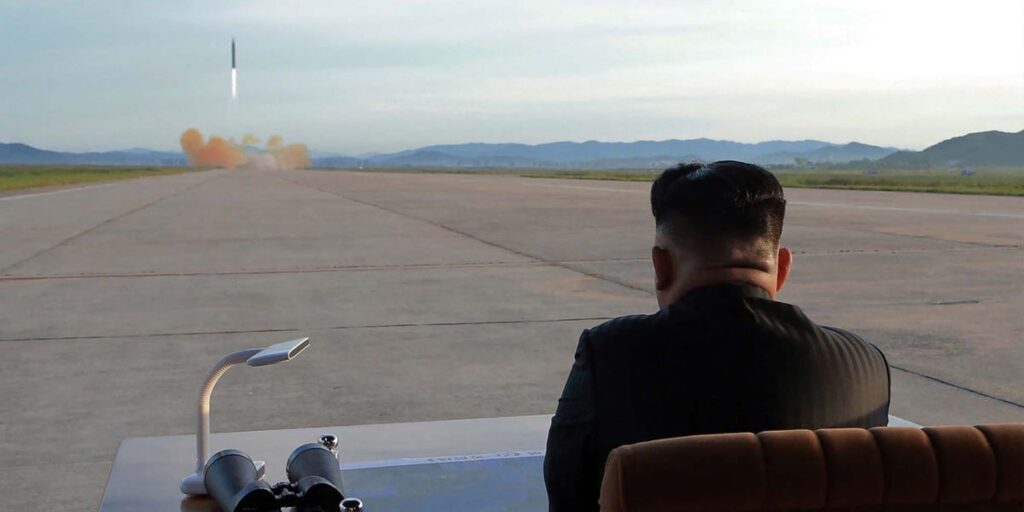Expanding Russia-North Korea Arms Deal: Strategic Implications and Technological Exchanged
In a recent summit, Russian President Vladimir Putin and North Korean leader Kim Jong-Un significantly deepened their arms deal and defense partnership. This development marks a pivotal moment in international relations and heightens security concerns across multiple regions. The summit, held last week in Pyongyang, underscored both nations’ intensified military collaboration.
North Korea’s provision of substantial ammunition shipments to Russia during its war in Ukraine has been pivotal. This assistance came at an opportune moment for Russia, facing critical shortages. Contrary to any altruistic motivations, Kim Jong-Un is leveraging this partnership to gain advancements and technologies that bolster North Korea’s military capabilities.
The Enigmatic Nature of the Russo-Korean Deal
While the precise details of what Moscow is offering Pyongyang in return remain undisclosed, experts speculate potential areas of exchange that are profoundly alarming. Since the U.S. first accused North Korea of supplying Russia with ammunition in September 2022, there has been widespread conjecture about the nature of this quid pro quo arrangement.
Last year’s summit between Putin and Kim, which resulted in the replenishment of Russia’s ammunition stockpiles, raised questions about North Korea’s expectations from this alliance. These questions have resurfaced following another historic meeting last week, where both leaders reaffirmed their strategic alignment and signed a significant defense pact.
Expert Opinions and Regional Implications
Victor Cha, Senior Vice President for Asia and Chair of the Korea Chair at the Center for Strategic and International Studies, articulated the gravity of this development. He remarked, "I think this is the biggest threat emanating from the Korean Peninsula since the Korean War." Cha further emphasized the profound and widespread ripple effects of this partnership, noting potential enhancements to North Korea’s nuclear program, missile capability, and naval fleet.
Enhancements in North Korea’s Military Capabilities
As Russia continues its offensive in Ukraine, North Korea’s support in the form of ammunition and weapons has become increasingly vital. Reports suggest that North Korea has supplied Russia with 152mm shells, 122mm rockets, and KN-23 ballistic missiles, bolstering Russia’s war effort.
Estimates regarding the quantity of ammunition North Korea has supplied to Russia vary significantly. However, it is believed to be in the millions, underscoring the substantial logistical support provided by Pyongyang.
Key Demands from North Korea
Nuclear-Powered Submarines
One of Kim’s key demands from Russia likely pertains to technology for nuclear-powered submarines. North Korea’s current submarine fleet, boasting between 64 to 86 conventionally powered vessels, requires frequent resurfacing for refueling, making them easily detectable. Nuclear-powered submarines, by contrast, would enable prolonged submersion, enhancing stealth and operational range.
This technological leap would markedly improve North Korea’s maritime capabilities, potentially allowing it to operate closer to U.S. shores and those of its allies. Acquiring technologies such as advanced acoustic systems or improvements to nuclear propulsion could be central to North Korea’s demands.
Nuclear Weapons Advancements
North Korea is also likely seeking advancements in nuclear weaponry and ballistic missile technology. U.S. Deputy Secretary of State Kurt Campbell recently indicated that discussions between Russia and North Korea likely involve nuclear or long-range missile development technologies. North Korea’s missile program, which includes intercontinental ballistic missiles (ICBMs) and hypersonic missiles, stands to gain significantly from Russian technological expertise.
Satellite Technology
Satellite technology represents another critical area of interest for North Korea. Russian President Putin has already promised to assist North Korea in building satellites, which could provide significant strategic advantages to Pyongyang. A functioning satellite network would enhance North Korea’s reconnaissance capabilities, enabling rapid identification of targets for its missile arsenal, thus improving its strike efficacy.
Fighter Jets and Manufacturing Enhancements
There are indications that North Korea might seek to acquire advanced fighter jets to modernize its air force. Additionally, improvements in ammunition manufacturing capabilities could be on the table. The effectiveness and quantity of North Korea’s munitions stockpiles could benefit from Russian expertise and resources.
Strategic Dynamics and Future Prospects
The evolving dynamic between Russia and North Korea brings into question the extent of military support that Putin is willing to provide. This situation is further complicated by South Korea’s potential decision to provide lethal aid to Ukraine directly, a move that could alter Russia’s strategic calculations.
As Scott Snyder, CEO of the Korea Economic Institute of America, noted during a recent panel discussion at the Center for Strategic and International Studies, the outcome of Russia’s support to North Korea may hinge significantly on the interactions between Moscow and Seoul. Putin’s willingness to provide advanced military capabilities to North Korea represents a critical leverage point in broader geopolitical negotiations.
Conclusion
The deepening of military and arms ties between Russia and North Korea signals a profound shift in the geopolitical landscape, with far-reaching implications for regional and global security. As the details of this partnership continue to unfold, the international community remains vigilant in assessing the strategic consequences of this burgeoning alliance.
Source: Business Insider
